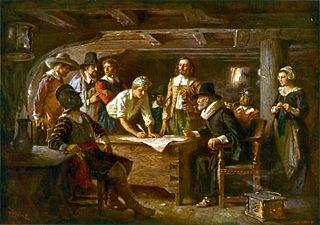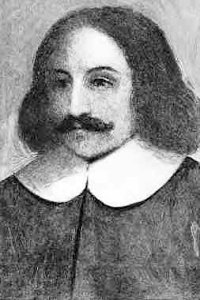Related Research Articles

John Alden was a crew member on the historic 1620 voyage of the Mayflower which brought the English settlers commonly known as Pilgrims to Plymouth Colony in Massachusetts. He was hired in Southampton, England as the ship's cooper, responsible for maintaining the ship's barrels. He was a member of the ship's crew and not a settler, yet he decided to remain in Plymouth Colony when the Mayflower returned to England. He was a signatory to the Mayflower Compact.

The Pilgrims, also known as the Pilgrim Fathers, were the English settlers who traveled to America on the Mayflower and established the Plymouth Colony in Plymouth, Massachusetts. The Pilgrims' leadership came from the religious congregations of Brownists, or Separatists, who had fled religious persecution in England for the tolerance of 17th-century Holland in the Netherlands.

The Mayflower Compact, originally titled Agreement Between the Settlers of New Plymouth, was the first governing document of Plymouth Colony. It was written by the men aboard the Mayflower, consisting of Separatist Puritans, adventurers, and tradesmen. Although the agreement contained a pledge of loyalty to the King, the Puritans and other Protestant Separatists were dissatisfied with the state of the Church of England, the limited extent of the English Reformation and reluctance of King James I of England to enforce further reform.

Plymouth Colony was the first permanent English colony in New England from 1620 to 1691 and the second permanent English colony in America, after the Jamestown Colony. It was settled by the passengers on the Mayflower at a location that had previously been surveyed and named by Captain John Smith. The settlement served as the capital of the colony and developed as the town of Plymouth, Massachusetts. At its height, Plymouth Colony occupied most of the southeastern portion of Massachusetts. Many of the people and events surrounding Plymouth Colony have become part of American folklore, including the American tradition of Thanksgiving and the monument of Plymouth Rock.

William Bradford was an English Puritan Separatist originally from the West Riding of Yorkshire in Northern England. He moved to Leiden in Holland in order to escape persecution from King James I of England, and then emigrated to the Plymouth Colony on the Mayflower in 1620. He was a signatory to the Mayflower Compact and went on to serve as Governor of the Plymouth Colony intermittently for about 30 years between 1621 and 1657. He served as a commissioner of the United Colonies of New England on multiple occasions and served twice as president. His journal Of Plymouth Plantation covered the years from 1620 to 1646 in Plymouth.

Tisquantum, more commonly known as Squanto, was a member of the Patuxet tribe best known for being an early liaison between the Native American population in Southern New England and the Mayflower Pilgrims who made their settlement at the site of Tisquantum's former summer village. The Patuxet tribe had lived on the western coast of Cape Cod Bay, but they were wiped out by an epidemic infection, likely brought by previous European explorers.

John Oldham was an early Puritan settler in Massachusetts. He was a captain, merchant, and Indian trader. His death at the hands of the Indians was one of the causes of the Pequot War of 1636–37.

Edward Winslow was a Separatist and New England political leader who traveled on the Mayflower in 1620. He was one of several senior leaders on the ship and also later at Plymouth Colony. Both Edward Winslow and his brother, Gilbert Winslow signed the Mayflower Compact. In Plymouth he served in a number of governmental positions such as assistant governor, three times was governor and also was the colony's agent in London. In early 1621 he had been one of several key leaders on whom Governor Bradford depended after the death of John Carver. He was the author of several important pamphlets, including Good Newes from New England and co-wrote with William Bradford the historic Mourt's Relation, which ends with an account of the First Thanksgiving and the abundance of the New World. In 1655 he died of fever while on an English naval expedition in the Caribbean against the Spanish.
Thomas Granger or Graunger was one of the first people hanged in the Plymouth Colony and the first known juvenile to be sentenced to death and executed in the territory of today's United States. He was a servant to Love Brewster, of Duxbury, in the Plymouth Colony of British North America. Graunger, at the age of 16 or 17, was convicted of "buggery with a mare, a cow, two goats, divers sheep, two calves, and a turkey", according to court records of September 7, 1642.

John Billington was an Englishman who travelled to the New World on the Mayflower and was one of the signers of the Mayflower Compact.

Of Plymouth Plantation is a journal that was written over a period of years by William Bradford, the leader of the Plymouth Colony in Massachusetts. It is regarded as the most authoritative account of the Pilgrims and the early years of the colony which they founded.
John Howland was an English indentured servant who accompanied the English Separatists and other passengers when they left England on the Mayflower to settle in Plymouth Colony. In later years, he was an executive assistant and personal secretary to Governor John Carver.

Isaac Allerton, and his family, were passengers in 1620 on the historic voyage of the ship Mayflower. Allerton was a signatory to the Mayflower Compact. In Plymouth Colony he was active in colony governmental affairs and business and later in trans-Atlantic trading. Problems with the latter regarding colony expenditures caused him to be censured by the colony government and ousted from the colony. He later became a well-to-do businessman elsewhere and in his later years resided in Connecticut.
The Reverend John Lyford was a controversial figure during the early years of the Plymouth Colony. After receiving degrees from Oxford University, he became pastor at Leverlegkish, near Laughgaid, Armagh, Ireland. He was the first ordained minister to come to the Plymouth Colony. He arrived in 1624 aboard the Charity and pretended to be sympathetic to the Separatist movement there, while in reality he was allied with the Church of England. In the months ahead, the leaders of the colony discovered that Lyford had been writing letters to England disparaging the Separatist movement at Plymouth. Governor William Bradford seized some of these letters before they were sent, opened them, and confronted Lyford about their contents. Lyford apologized, but later wrote another similar letter that was also intercepted. After the second incident, Lyford was sentenced to banishment.
Hobbamock was a Pokanoket pniese who came to live with the Plymouth Colony settlers during the first year of their settlement in North America in 1620. His name was variously spelled in 17th century documents and today is generally simplified as Hobomok. He is known for his rivalry with Squanto, who lived with the settlers before him. He was greatly trusted by Myles Standish, the colony's military commander, and he joined with Standish in a military raid against the Massachuset. Hobomock was also greatly devoted to Massasoit, the sachem of the Pokanoket, who befriended the English settlers. Hobomok is often claimed to have been converted to Christianity, but what that meant to him is unclear.

Capt. Christopher Levett was an English writer, explorer and naval captain, born at York, England. He explored the coast of New England and secured a grant from the king to settle present-day Portland, Maine, the first European to do so. Levett left behind a group of settlers at his Maine plantation in Casco Bay, but they were never heard from again. Their fate is unknown. As a member of the Plymouth Council for New England, Levett was named the Governor of Plymouth in 1623 and a close adviser to Capt. Robert Gorges in his attempt to found an early English colony at Weymouth, Massachusetts, which also failed. Levett was also named an early governor of Virginia in 1628, according to Parliamentary records at Whitehall.
Robert Gorges was a captain in the Royal Navy and briefly Governor-General of New England from 1623 to 1624. He was the son of Sir Ferdinando Gorges. After having served in the Venetian wars, Gorges was given a commission as Governor-General of New England and emigrated to modern Weymouth, Massachusetts, in 1623, building his settlement on the site of the failed Wessagusset Colony.
Capital punishment, more commonly known as the death penalty, was a legal form of punishment from 1620 to 1984 in Massachusetts, United States. This practice dates back to the state's earliest European settlers. Those sentenced to death were hanged. Common crimes punishable by death included religious affiliations and murder.
The murder of Penowanyanquis took place in Plymouth Colony in July 1638. Penowanyanquis, a Native American man who was part of the Nipmuc, was attacked by four runaway indentured servants – Thomas Jackson, Richard Stinnings, Daniel Cross, and their informal leader Arthur Peach, the four sometimes being referred to as the "Peach Gang" – during a botched attempt at highway robbery. Penowanyanquis lived for several days after the attack, long enough to identify his attackers. After the four were arrested, Cross fled before he could be taken to trial and was never relocated, but Stinnings, Jackson, and Peach were all taken into custody, convicted of murder and robbery, and judicially executed in September 1638.